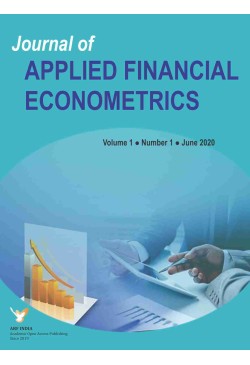
Journal of Applied Financial Econometrics
Frequency :Bi-Annual
ISSN :2583-374X
Peer Reviewed Journal
EMPIRICAL REVIEW OF IMPLICATIONS OF FINANCIAL LEVERAGE ON PERFORMANCE OF QUOTED OIL AND GAS COMPANIES IN NIGERIA
EFFECT OF WORKING CAPITAL INVESTMENT AND FINANCING POLICIES ON THE PROFITABILITY OF LISTED INDUSTRIAL GOODS COMPANIES IN NIGERIA
Working capital and financing decisions or policies are essential in determining companies’ capacity to invest in any securities, be it non-current or current assets which has a significant role in retaining the organization’s liquidity, solvency, survival, continuity and profitability. This study investigates the effect of working capital investment and financing policies on the profitability of listed industrial goods companies in Nigeria. The ex-post facto research design was adopted, and data were sourced from annual reports and accounts of 21 listed industrial goods companies in Nigeria, out of which 14 firms were selected and form the sample size with 140 firm-year observations for the period of 10 years from 2012 to 2021. The ordinary Least Square (OLS) regression model was employed to analyze the data. The test of normality, multicollinearity, and heteroscedasticity were all conducted to improve the reliability and validity of statistical results. Also, the model selection using a Hausman specification test was conducted to determine between random and fixed effects models. The outcome enables the study to reject the fixed and accepted random effect estimator. The study established that aggressive and conservative investment policy have negative and insignificant impact on profitability. The conservative financing policy has a positive and insignificant effect on profitability, while aggressive financing policy has a positive and significant impact on profitability. Hence, the study concludes that aggressive financing policy and conservative financing policy improve profitability, and aggressive investment policy and conservative investment policy reduce the profitability of listed industrial goods companies in Nigeria. The study recommends that companies should mbrace aggressive financing policies as a way of increasing their profitability. This will enable the companies to use an appreciable level of current liability to finance their operations’ thereby attracting more improve to enhance a significant positive impact on their profitability. This will enable the companies to use more current assets to finance the industrial goods, thereby generating more profits for firms and shareholders.
Keyword: Profitability; Aggressive investment policy; Conservative investment policy; Aggressive financing policy; Conservative financing policy
INTER RELATIONSHIP BETWEEN RAINFALL INDEX AND NIFTY INDEX: AN EMPIRICAL STUDY
INTERNATIONAL TRADE AND ECONOMIC DEVELOPMENT IN NIGERIA
OIL PRODUCTION AND THE NIGERIAN ECONOMY: AN ANALYSIS OF THE CONTRACTUAL ARRANGEMENTS
MONETARY POLICY AND INDUSTRIAL SECTOR PERFORMANCE IN NIGERIA: MEASURING THE EXTENDED IMPACT ON THE ECONOMY